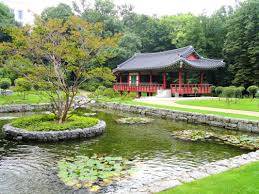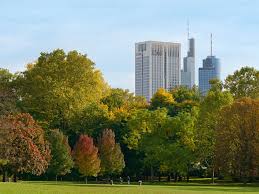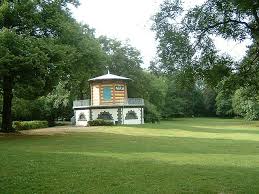The Grüneburgpark is a park in the Westend district of Frankfurt, whose name derives from the "Green castle", which stood on the site in the 14th century. In 1789 the banker Peter Heinrich von Bethmann Metzler acquired the property and designed the park. In the following years the great thinkers of the day met here, among them Johann Wolfgang von Goethe and Bettina von Arnim.
In 1837, the park was bought by the Rothschild family, who had a palais constructed in the manner of a French Loire castle. The Rothschild family had a 29-hectare-large landscaped park developed in this location. The English-style park itself was finished in 1877 by Heinrich Siesmayer.
In 1935, after the Nazi rise to power, Albert von Goldschmidt-Rothschild, who committed suicide in emigration five years later, had to "transfer to the municipality" (quote from a letter to mayor Krebs) what had been the home of his family. The "New Palais" was destroyed in an air raid in 1944.
After the Second World War, the park was expanded to 29 hectares. It has since been a popular place for recreation among the Frankfurters, especially in the summer months. The park's northwest corner is now a botanical garden, the Botanischer Garten der Johann Wolfgang Goethe-Universität Frankfurt am Main. Another major botanical garden, the Palmengarten, is just across the street.
The park is also home to the 4,800-square-metre Korean Garden. This was a gift to the city as part of South Korea's presentation as the guest of honour at the 2005 Frankfurt Book Fair. It has been designed in the style of traditional Korean scholars' gardens.




